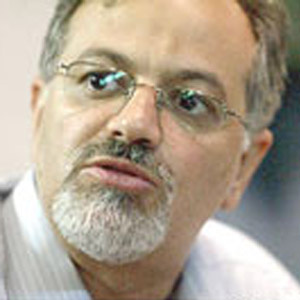Being in the Shot Does Iranians No Good
Ahmad Shirzad believes that for Ahmadinejad’s administration propaganda is the priority in negotiations with West.

A few days to the end of G20 two-month deadline G20 for Iran to start nuclear negotiations, West’s frustration at Iran’s response, EU and United States’ likely measures to pressurize Tehran, chances of Iranians sitting at the table of negotiations with Washington and Tehran’s goals have turned into analysts’ favorite topics. Iranian Diplomacy has interviewed Ahmad Shirzad, member of the Sixth Parliament and foreign affairs analysts on the prospect of Iran’s nuclear case:
With the recent political developments in Iran, how powerful is Tehran’s leverage when sitting at the table of negotiations with Five Plus One or the United States?
Tehran’s leverage has definitely become weaker. In fact, this is the least appropriate time for Tehran to start talks with Washington. With the post-election developments, the international face of Iranian establishment has been damaged. But on the other hand, this is a historic and exceptional opportunity which may be never repeated.
In fact, Obama’s presidency and the opening he has provided for Iran may not be repeated. Obama had put forward talks with Iran as one of his campaign slogans and now he can not just withdraw his promise. Clearly White House wishes it could take back the negotiations proposal under pressure from U.S. public opinion, especially the Iranian expatriates. That would target all the blames towards Iran.
At any rate, with regard to national interests, this is the best opportunity for Iranian statesmen, despite the public feeling inside the country about the election episodes. We want the Iranian diplomats not to yield to U.S. pressure during bargains because of the weak position Iran is now in.
With the United States turning towards all-out sanctions and EU’s tendency to join, do you think that West has lost hope for Iran’s positive response to negotiations proposal?
Apparently, Westerns think that Iran will not enter the talks. Of course I think the same. For the current Iranian administration, a favorable negotiation is one that takes place between the conservatives in Iran –particularly Ahmadinejad’s team- and Obama’s administration, not one between the two political regimes. For Ahmadinejad and his team, it is of the utmost importance to make a propaganda tool from every occasion. Unfortunately forgotten here are the national interests. If the negotiations were viewed from that respect, despite all the differences inside we would all welcome all-inclusive, serious, high-level talks based on national interests.
What are the chances of nuclear talks between Iran and Five Plus One or Washington? And what would Tehran’s likely goals be?
The possibility is really low. And Ahmadinejad’s administration merely wants to use it as another propagandistic tool not as a solution to problems between Iran and West. It seems that for this government, a photo is what truly counts. That would benefit in a normal situation but not at the current circumstances. West will definitely ask Ahmadinejad for a big compromise with that photo. It is better not to take the photo but follow serious, beneficial and transparent negotiations.
With the recent political developments in Iran, how powerful is Tehran’s leverage when sitting at the table of negotiations with Five Plus One or the United States?
Tehran’s leverage has definitely become weaker. In fact, this is the least appropriate time for Tehran to start talks with Washington. With the post-election developments, the international face of Iranian establishment has been damaged. But on the other hand, this is a historic and exceptional opportunity which may be never repeated.
In fact, Obama’s presidency and the opening he has provided for Iran may not be repeated. Obama had put forward talks with Iran as one of his campaign slogans and now he can not just withdraw his promise. Clearly White House wishes it could take back the negotiations proposal under pressure from U.S. public opinion, especially the Iranian expatriates. That would target all the blames towards Iran.
At any rate, with regard to national interests, this is the best opportunity for Iranian statesmen, despite the public feeling inside the country about the election episodes. We want the Iranian diplomats not to yield to U.S. pressure during bargains because of the weak position Iran is now in.
With the United States turning towards all-out sanctions and EU’s tendency to join, do you think that West has lost hope for Iran’s positive response to negotiations proposal?
Apparently, Westerns think that Iran will not enter the talks. Of course I think the same. For the current Iranian administration, a favorable negotiation is one that takes place between the conservatives in Iran –particularly Ahmadinejad’s team- and Obama’s administration, not one between the two political regimes. For Ahmadinejad and his team, it is of the utmost importance to make a propaganda tool from every occasion. Unfortunately forgotten here are the national interests. If the negotiations were viewed from that respect, despite all the differences inside we would all welcome all-inclusive, serious, high-level talks based on national interests.
What are the chances of nuclear talks between Iran and Five Plus One or Washington? And what would Tehran’s likely goals be?
The possibility is really low. And Ahmadinejad’s administration merely wants to use it as another propagandistic tool not as a solution to problems between Iran and West. It seems that for this government, a photo is what truly counts. That would benefit in a normal situation but not at the current circumstances. West will definitely ask Ahmadinejad for a big compromise with that photo. It is better not to take the photo but follow serious, beneficial and transparent negotiations.

